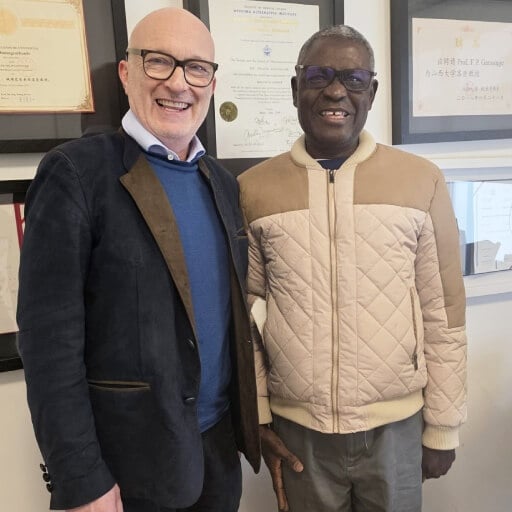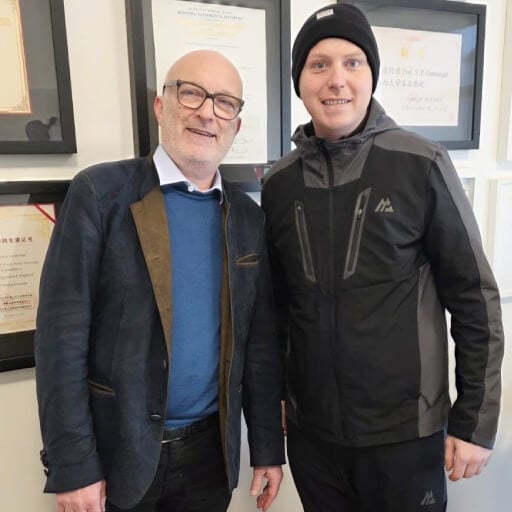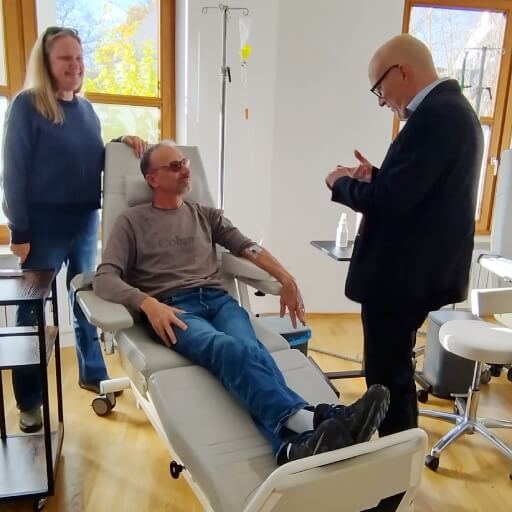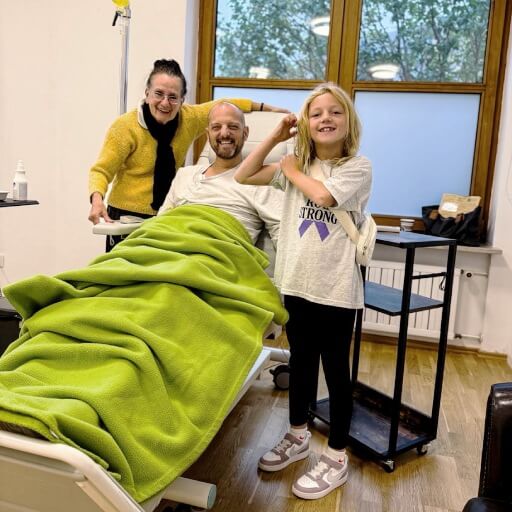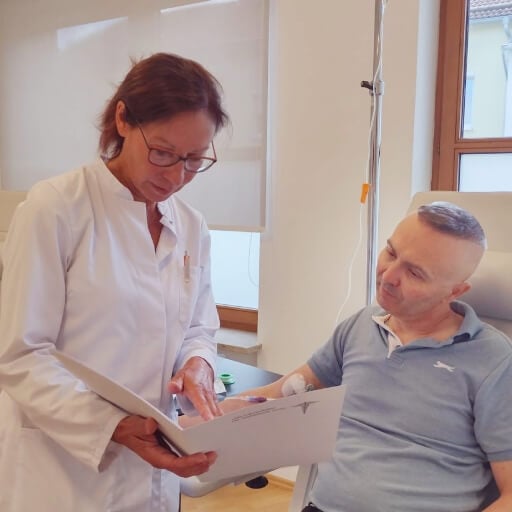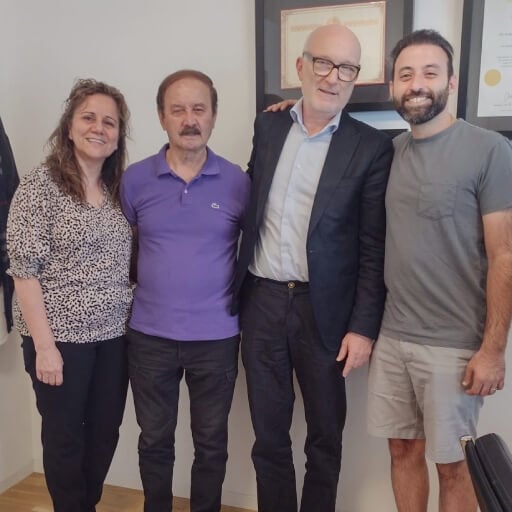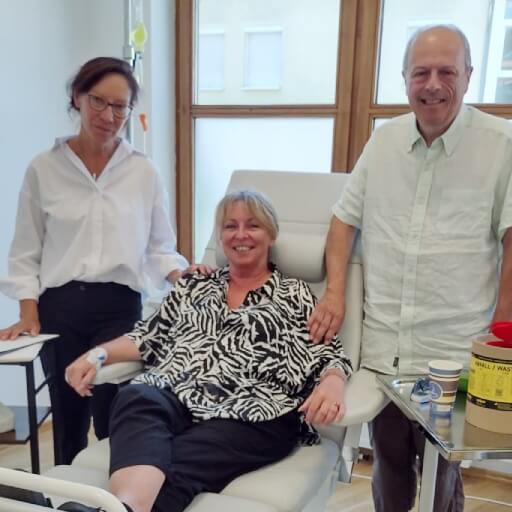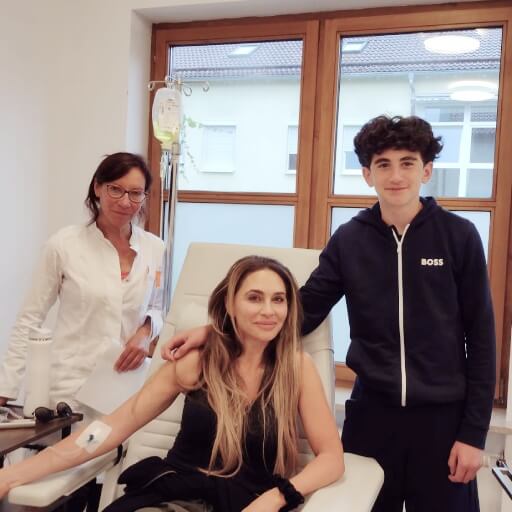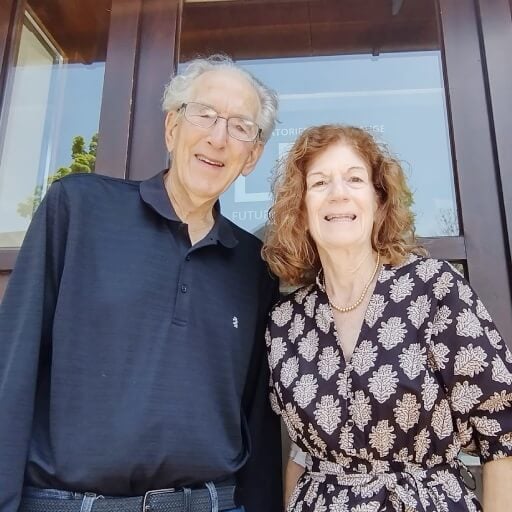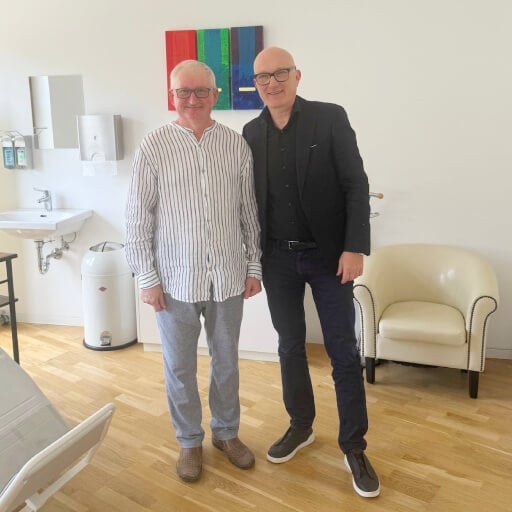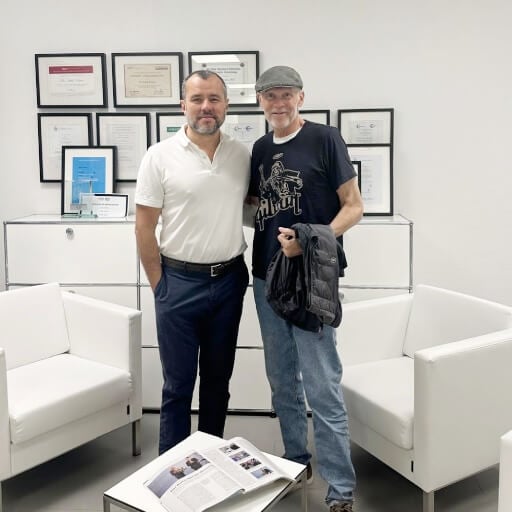Dendritic cell-based immunotherapy is the administration of individually manufactured vaccines based on the genetic characteristics of a tumor in a particular person [1]. Cancer treatment with dendritic cells is indicated even for those patients who have not responded to all other types of therapy. In Europe, vaccination is possible in any stage of cancer and has virtually no contraindications. Booking Health specialists elaborate comprehensive medical programs and help undergo dendritic cell-based immunotherapy in specialized foreign hospitals with high treatment success rates.
Why do more and more people with cancer trust dendritic cell therapy?
Cancer treatment with dendritic cells is a new topical and demanded area of oncology in Europe, a part of immunotherapy.
"In 2011, American immunologist Ralph Steinman received the Nobel Prize for their discovery." [2]
Specialized oncology centers in Europe offer this type of treatment to an increasing number of patients. Patients most actively visit hospitals in Germany connected with the high level of medical care and the extensive experience of German healthcare professionals in treating cancer with this method.
Over the past decade, dendritic cells have been actively studied in clinical trials as a monotherapy and in combination with other treatments. The results of the clinical trials were encouraging: they demonstrated better control of the oncological process, a higher chance of achieving remission, and a lower risk of recurrence due to long-term antitumor immunity.
For instance, a recent comprehensive review by Hato et al. (2024) [3] highlights dendritic cell vaccination (DCV) as a promising approach to cancer immunotherapy. The review outlines DCV's unique ability to coordinate both innate and adaptive immune responses against tumors, making it particularly valuable in cases where traditional drugs have limited efficacy. In particular, DCV shows particular promise in the treatment of immune desert tumors, where other immunotherapy approaches often fail.
Thanks to this, the dendritic cell vaccines (DC vaccines) have been included in the updated protocols for the treatment of many types of cancer, such as melanoma, glioblastoma, osteosarcoma, pleural mesothelioma, colon cancer, breast cancer, kidney cancer, lung cancer, pancreatic cancer, and so on.
Dendritic cell therapy offers a promising alternative to traditional cancer treatments, potentially improving prognosis by stimulation of the immune system to target tumor cells. This innovative approach can address various cancer signs, including bone pain, while potentially enhancing overall healing and reducing long-term costs compared to conventional therapies. The therapy's effectiveness is often assessed through specific markers and its ability to increase immunogenicity, though results may vary depending on individual patient factors and tumor characteristics.
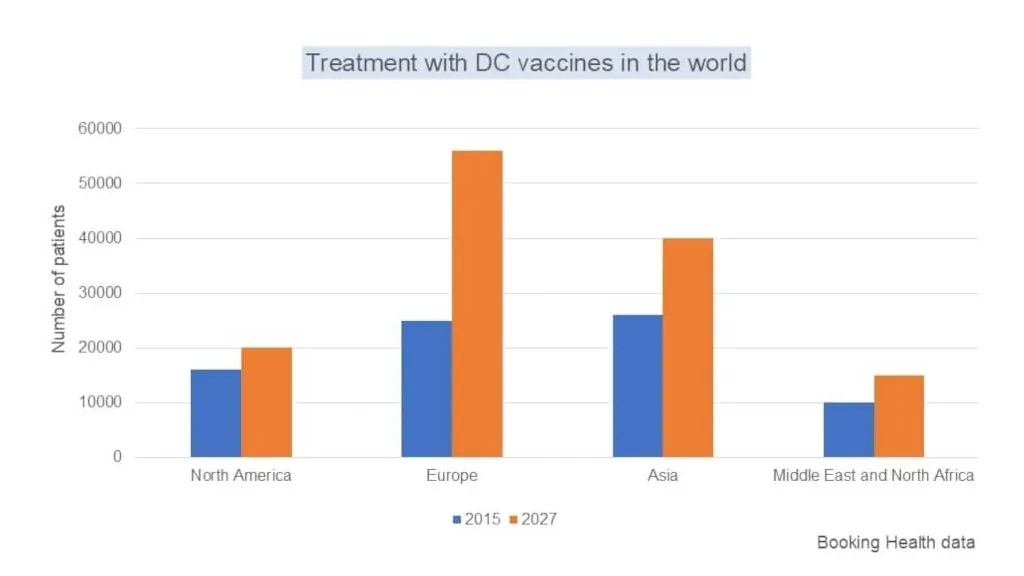
What types of cancer are effectively treated with dendritic cells?
This approach has demonstrated outstanding results in the treatment of the following cancers [3]:
- Treatment of melanoma with dendritic cells
- Treatment of brain tumors with dendritic cells
- Treatment of breast cancer with dendritic cells
- Treatment of bowel cancer with dendritic cells
- Treatment of osteosarcoma with dendritic cells
- Treatment of soft tissue sarcoma with dendritic cells
- Treatment of pleural mesothelioma with dendritic cells
- Treatment of pancreatic cancer with dendritic cells
- Treatment of lung cancer with dendritic cells
- Treatment of prostate cancer with dendritic cells
- Treatment of psoriasis with dendritic cells
- Treatment of rheumatoid arthritis with dendritic cells
- Treatment of cervical cancer with dendritic cells
- Treatment of ulcerative colitis with dendritic cells
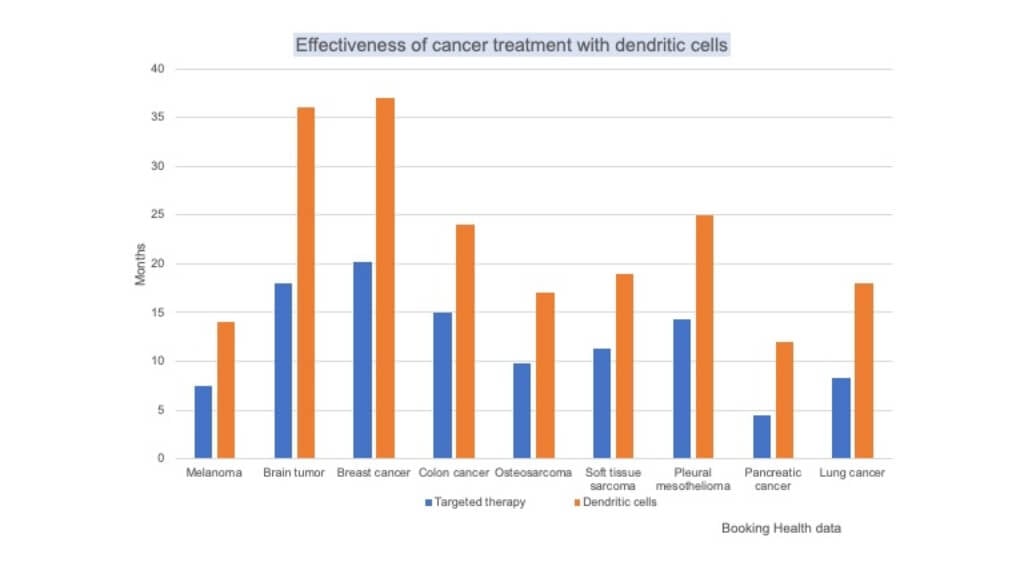
Why is dendritic cell therapy effective for cancer treatment?
Conventional cancer treatments include minimally invasive surgical manipulations and open surgeries, chemotherapy, and different radiation therapy modalities. Hormone therapy and targeted therapy are also common approaches, working to block cancer growth by interfering with specific molecules or receptors.
Dendritic cell therapy represents a new generation of cancer treatment. Instead of directly attacking cancer cells, it strengthens the patient's immune system. This therapy turns a patient’s dendritic cells into specialized cancer-fighting agents that can recognize and target cancer cells specifically. Unlike conventional treatments, this approach helps the body develop a safer, natural defense against cancer cells.
A 2024 study by Kamigaki et al. [4] highlights how dendritic cell-based vaccines can be personalized to target specific cancer neoantigens, making the treatment highly specific to each patient's unique cancer profile and avoiding significant collateral damage.
This is further supported by Ingels et al. (2024) [5], whose research in lung cancer patients showed that dendritic cell therapy induced long-lasting immune responses with minimal side effects – only grade 1-2 adverse events were observed, compared to the often severe side effects of traditional treatments.
Thus, the advantages of dendritic cell therapy over traditional methods are significant. While chemotherapy and radiation often cause severe side effects like fatigue, nausea, and immune system suppression, dendritic cell therapy typically produces minimal undesirable reactions. It's particularly effective in cases where standard treatments show limitations, such as in non-immunogenic tumors, and can be carried out even in debilitated patients.
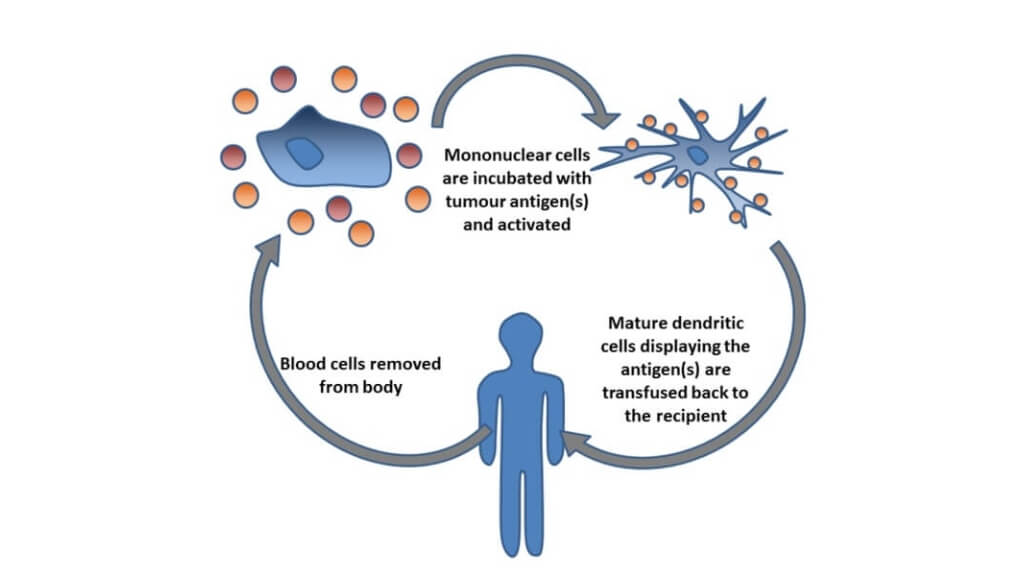
Step-by-step process of dendritic cell cancer therapy
Dendritic cell therapy is one of the most efficient cancer treatment options. The main obstacle in oncology treatment is the lack of immunological tumor suppression. Malignant cells manage to hide from the immune system, so they have enough time to develop into a tumor.
The treatment process consists of three main steps:
Step 1 begins with a comprehensive clinical history, examination, and laboratory tests. During this outpatient visit, physicians collect blood for manufacturing the individual vaccine.
Step 2 is an optional rehabilitation phase while waiting for the vaccine preparation. During this 7-day inpatient period, patients receive comprehensive care, diet nutrition, physiotherapeutic procedures, and symptomatic treatment as needed.
Step 3 is the dendritic cell vaccination. This outpatient procedure includes the administration of the personalized vaccine, along with any necessary symptomatic treatment and specialist consultations.
«Each patient receives a personalized vaccine that best suits his cancer type, genetics, symptoms, and general condition.»
Along with the vaccination, doctors administer anti-inflammatory agents. Studies by the Institute for Tumor Therapy in Duderstadt (Germany), the Clinic for Tumor Biology in Freiburg (Germany), and the Meridian Medical Group in New York (USA) have shown that malignant tumors suppress the work of dendritic cells, and one of the causes is local inflammation. By eliminating this factor, doctors further increase the effectiveness of cancer treatment.
The dendritic cell therapy can be performed at any stage of cancer treatment and effectively complements all types of oncological care. For vaccine manufacturing, several approaches can be used. While tumor tissue samples can be utilized when available, they are not mandatory for treatment. Liquid biopsy, a sophisticated method that detects circulating tumor cells in the blood, provides an effective alternative for identifying cancer markers.
Immunotherapy increases the effectiveness of chemotherapy without the associated increase in the toxicity of chemotherapeutic agents. This makes it possible to conduct a shorter course of chemotherapy and improve its tolerability. By itself, immunotherapy has mild side effects. The most significant is a flu-like syndrome in the first few days.
«Conducting cellular immunotherapy in the early stages of cancer can even lead to a complete recovery.»
After dendritic cell vaccinations in the advanced stages of cancer, the patient can expect relief of cancer symptoms and a longer life expectancy and higher survival rates. The effect of vaccination remains for a long time, as the anti-cancer immunity stimulated by the first course of vaccination maintains independently without repeated procedures.
«Dendritic cell vaccine is an innovative method for the treatment of many cancers, including those for which there are currently no effective therapeutic methods. Unlike the conventional oncology treatments, vaccination is minimally invasive and is not associated with unwanted side effects from long-term medications intake.»
The effectiveness of dendritic cell therapy is best illustrated through the experiences of healthcare professionals and patients who have witnessed its benefits firsthand. Prof. Gansauge, who heads the Department of Oncology and Dendritic Cell Therapy in the LDG Laboratories Dr. Gansauge Berg, has extensively documented the treatment's success across various cancer types. In his comprehensive interview, he explains how dendritic cell therapy can be seamlessly integrated with other treatment methods while offering minimal side effects.
Expert Insights from Prof. Gansauge: The Power of Dendritic Cell Therapy in Cancer Treatment
Real-life experiences of cancer patients with dendritic cell therapy
The cancer immunotherapy with dendritic cells in Germany consists of the following steps:
- Request for treatment on the Booking Health website. You specify your diagnosis and, if possible, attach the results of previous examinations.
- Communication with a Booking Health medical advisor. After studying the available medical records, the doctor will ask you clarifying questions about your current complaints and the treatment already performed. This will help to choose the most effective medical program, including additional examinations and consultations with narrow specialists.
- Visit the hospital, initial consultation with the attending physician, and laboratory examination. A doctor of a foreign clinic will conduct a full examination and prescribe tests to assess your general condition and monitor the effectiveness of therapy.
- Minimally invasive immune cells collection: a small amount of blood (about 200 ml) will be harvested from your peripheral vein. The procedure is well tolerated and does not take long.
- Cultivation of blood cells in a GMP-certified laboratory in accordance with high European standards. Strictly following protocols for dendritic cell processing, doctors obtain sufficient cellular material from just 200 ml of blood.
- Vaccine infusion. Depending on the type of cancer, the ready individual vaccine is administered intradermally or subcutaneously. Doctors make an injection in the area of localization of the tumor or large lymphatic nodes.
- Medical follow-up after treatment and repeated vaccination (if necessary). The attending physician evaluates the dynamics of your condition improvement and the activity of tumor destruction.
Why do more and more cancer patients trust dendritic cell therapy?
Particularly compelling is the case of Daria Rogers, who sought treatment for glioblastoma multiforme (GBM), one of the most aggressive brain cancers. Three months after receiving dendritic cell therapy in Germany, her MRI results showed remarkable improvement. "Only dendritic cell treatment could be responsible for our results," she emphasizes, noting that the therapy complemented her overall treatment strategy effectively.
These real-world cases highlight not just the medical efficacy of dendritic cell therapy, but also its practical advantages – the treatment process is straightforward, with minimal disruption to patients' lives. As Daria advises other cancer patients: "You need to go early, you need to go quickly." Such testimonials demonstrate why dendritic cell therapy is gaining recognition as a promising option for cancer treatment.
Patient Daria Rogers, Ireland: "Dendritic Cell Therapy Gave Me Hope After Glioblastoma Diagnosis"
Increasing the effectiveness of dendritic cells in cancer by combining them with other treatments
To maximize the activation of antitumor immunity, oncologists in Europe combine vaccination with other advanced immunotherapy techniques:
- Virotherapy. Tumors are infected with an oncolytic virus, such as the Newcastle disease virus (NDV). The immune system recognizes the cells affected by the virus and actively destroys them.
- Hyperthermia. With local heating of the affected body region or general heating of the whole body, malignant cells produce substances that the immune system can find and destroy.
- Therapy with immune checkpoint inhibitors. Tumors can affect the human immune system, blocking the already existing anticancer response. Drugs from the group of immune checkpoint inhibitors restore anticancer immunity.
- Modulation of the tumor microenvironment. As the tumor grows, it forms a surrounding microenvironment with favorable conditions: active blood supply, nutrients, and growth factors. Oncologists explore these factors and deprive the tumor of the conditions necessary for its active growth.
- Optimization of the level of trace elements and vitamins. Nutrients are required for the normal functioning of the immune system, e.g., vitamins A and E, zinc, and fiber. In patients with oncology, these substances are actively absorbed by the tumor. Oncologists adjust the patient's diet to make up for all deficiencies. Special nutritional formulas and dietary supplements are often prescribed.
European cancer centers have experienced teams of healthcare professionals who create individualized treatment plans for each person with cancer.
Dendritic Cell Therapy: Patient Stories with Booking Health
Dendritic cell cancer treatment in Germany with Booking Health
Cancer treatment with dendritic cells is available at several leading German medical centers. LDG - Laboratories Dr. Gansauge in Berg stands out with its comprehensive approach and exceptional success rates in dendritic cell therapy, backed by extensive research and clinical experience. Other notable facilities include the IOZK Immuno-Oncology Center in Cologne and Praxisgemeinschaft für Zelltherapie in Duderstadt. The cost of dendritic cell therapy ranges from 20,000 to 38,000 euros, depending on the combination with additional therapeutic services and individual treatment requirements.
Booking Health, an international medical tourism operator with over 12 years of experience, has been successfully organizing cancer treatment for patients from 75 countries. The company's expertise in facilitating dendritic cell therapy is confirmed by the prestigious ISO 9001:2015 certificate and numerous positive client reviews. As your dedicated medical tourism partner, Booking Health provides comprehensive support throughout your treatment journey.
Booking Health specialists will fully organize your medical trip and assist you with:
- Expert analysis of your medical case and selection of the most suitable specialized clinic
- Direct communication with leading oncologists and priority appointment scheduling
- Development of a comprehensive treatment program without unnecessary procedures
- Exclusive pricing arrangements with German clinics (savings up to 50% of the original cost)
- Personal medical coordinator and professional interpretation services
- Complete travel arrangements including accommodation, flights, and visa support
- Post-treatment support and follow-up care coordination
- Assistance in purchasing and forwarding medicines for the subsequent treatment
- Management of medical invoices and return of unused funds
- Organization of additional examinations or therapeutic procedures as needed
You can explore detailed information about doctors and hospitals on the Booking Health website and submit your treatment request online. Our specialists will help develop a personalized medical program that may combine dendritic cell therapy with other necessary treatments and rehabilitation services.
Frequently asked questions of our patients about dendritic cell cancer treatment
Send request for treatmentDendritic cell therapy is an advanced form of immunotherapy that uses dendritic cells to stimulate the immune system to attack cancer cells. These cells are collected from the patient, modified to recognize cancer cells, and reintroduced into the body to enhance the immune response against the tumor.
The effectiveness of dendritic cell therapy varies depending on the type and stage of cancer. Clinical trials and studies have shown promising results, with many patients experiencing significant improvements in their condition and prolonged survival rates.
Dendritic cell therapy is generally well-tolerated, with most side effects being mild and temporary. Common side effects include fever, fatigue, and injection site reactions. Severe side effects are rare but can occur, necessitating close monitoring by healthcare professionals.
Dendritic cell therapy can be used to treat various types of cancer, including melanoma, prostate cancer, lung cancer, breast cancer, and glioblastoma. It is particularly beneficial for cancers that have not responded well to conventional treatments.
The therapy involves collecting dendritic cells from the patient, modifying them in a laboratory to recognize cancer cells, and then injecting them back into the patient's body. This process helps the immune system identify and destroy cancer cells more effectively.
During an outpatient procedure, blood monocytes are collected and cultured with specific growth factors and tumor antigens to develop into mature dendritic cells. The personal dendritic cell vaccine is later injected back to stimulate an immune response against cancer cells.
Dendritic cell therapy is generally available for adult patients over 18 years old, though specific age limits may vary by treatment center and clinical protocols.
The cost of dendritic cell cancer treatment in Germany depends on the type of tumor, the stage of the disease and the number of vaccination courses. On average a full course costs between 20,000€ and 38,000€, which includes the laboratory production of the personalized vaccine, medical supervision and follow-up.
Germany is a leading country for cancer treatment with dendritic cells. Specialized oncology centers provide careful patient selection. They do personalized vaccine preparation and close monitoring during therapy. They also combine established protocols with innovative immune-based approaches (to maximize safety and effectiveness).
Choose treatment abroad and you will be sure to get the best results!
Authors:
This article was edited by medical experts, board-certified doctors Dr. Nadezhda Ivanisova, and Dr. Bohdan Mykhalniuk. For the treatment of the conditions referred to in the article, you must consult a doctor; the information in the article is not intended for self-medication!
Our editorial policy, which details our commitment to accuracy and transparency, is available here. Click this link to review our policies.
Sources:
[1] Rachel L Sabado, Sreekumar Balan, Nina Bhardwaj. Dendritic cell-based immunotherapy. Cell Res. 2017 Jan;27(1):74-95. doi: 10.1038/cr.2016.157. Epub 2016 Dec 27. [DOI] [PubMed]
[2] Roman Volchenkov, Florian Sprater, Petra Vogelsang, Silke Appel. The 2011 Nobel Prize in physiology or medicine. Scand J Immunol. 2012 Jan;75(1):1-4. doi: 10.1111/j.1365-3083.2011.02663.x. [DOI] [PubMed]
[3] Laura Hato, Angel Vizcay, Iñaki Eguren et al. Dendritic Cells in Cancer Immunology and Immunotherapy. Cancers (Basel). 2024 Feb 28;16(5):981. doi: 10.3390/cancers16050981. [DOI] [PMC free article]
[4] Takashi Kamigaki, Rishu Takimoto, Sachiko Okada et al. Personalized Dendritic-cell-based Vaccines Targeting Cancer Neoantigens. Anticancer Res. 2024 Sep;44(9):3713-3724. doi: 10.21873/anticanres.17196. [DOI] [PubMed]
[5] Joline Ingels, Laurenz De Cock, Dieter Stevens et al. Neoantigen-targeted dendritic cell vaccination in lung cancer patients induces long-lived T cells exhibiting the full differentiation spectrum. Cell Rep Med. 2024 May 21;5(5):101516. doi: 10.1016/j.xcrm.2024.101516. [DOI] [PubMed]
Read:
Immunotherapy for Cancer Treatment
Article menu:
- Why do more and more people with cancer trust dendritic cell therapy?
- What types of cancer are effectively treated with dendritic cells?
- Why is dendritic cell therapy effective for cancer treatment?
- Step-by-step process of dendritic cell cancer therapy
- How to organize dendritic cell therapy?
- Real-life experiences of cancer patients with dendritic cell therapy
- Increasing the effectiveness of dendritic cells in cancer by combining them with other treatments
- Dendritic cell cancer treatment in Germany with Booking Health
- Frequently asked questions of our patients about dendritic cell cancer treatment
Don't know where to start?
Contact Booking Health
